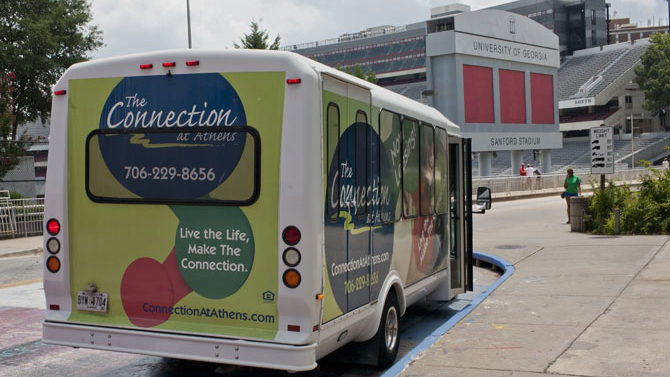Apartment complexes’ private shuttles that have multiplied over the last several years might be costing everyone money. Their residents, Athens Transit riders, taxi companies and their customers and even independently mobile taxpayers all stand to lose from the proliferation of the shuttles. But, as is often the case, low-income Athenians stand to lose the most, as well-heeled University of Georgia students opt out of public transit in favor of trendier transportation.
Butch McDuffie, director of Athens Transit, counts at least 13 complexes now offering private shuttles to their residents. He finds that the explosion in downtown student apartments has forced outlying complexes to offer the shuttles to compete with their new campus-proximate counterparts, like 909 Broad and The Standard. This is after Athens Transit worked hard to facilitate campus-bound transit for student residents in complexes like Abbey West and The Connection.
“We enhanced frequency, even started new service,” says McDuffie, whose department went so far as to fund sheltered bus stops for the complexes.
The complexes, however, are able to attract new student residents with their convenient service. UGA students Gabrielle Taormina and Booja Patel say that their choice of Atlanta Highway’s The Connection was in part due to the complex’s two shuttles, which during fall and spring semesters run at double the frequency of Athens buses and offer an express route to campus. “It was a deciding factor,” says Taormina, who transferred from Georgia Southern and relied on her Athens friends for advice on where to live. “My friends said that that’s how they got to campus.”
The weekend “drunk bus” service is popular, as well. Patel says she sometimes uses it, and Sandra Jones, a shuttle driver, reports that the Friday- and Saturday-night service is very popular with residents, with shuttles sometimes full. The routes run frequently on weekend nights—Athens Transit stops running at 10 p.m.—and the 3 a.m. final route allows late-night drinkers to get home safely and reliably. Parents, no doubt, are comforted by the safety the service affords.
The late-night service cuts into the business of taxi companies, too, says Talmadge Horton of 5 Stars Taxi. “Every year there’s a new complex and a new shuttle,” he says. Horton’s company loses money from the shuttles, potentially making the cabs more expensive for the rest of Athenians. “We’ll dispatch a driver,” says Horton, “only to see the shuttle drive off [with the caller] when we get there.” Only on game days and other peak times does 5 Star see the business it once did.
Yassin Bakhit, owner of United Taxi, has watched his company lose business, too, and Bakhit reports that shuttles will even stray from their routes and make ad hoc pickups to become taxi-like, further eating into United’s business. “It really has cost us a lot,” he says.
McDuffie says that Athens Transit couldn’t compete once shuttle fever gripped the apartment market. The comparatively rapid frequency and exclusivity of shuttles could not be matched by a municipal service whose responsibility is to all citizens. Furthermore, the shuttles could go onto the often expansive properties, many of them gated, and offer essentially curbside service. It was a severe blow to Athens Transit ridership.
“Last year, we documented a loss of ridership of 35–45,000 trips over the year,” says McDuffie. “We were competing for the same rider.”
That competition also pits wealthier students against Athenians of lesser means. The riders lost to the shuttles are wealthy enough to have funded a privatized alternative to the public transit system. While some less fortunate Athenians search couch cushions for bus fare, shuttle riders are happy to overpay for their exclusive service.
Student shuttle riders “are paying for bus service twice,” McDuffie explains. The university pays Athens Transit to offer free service to students, a substantial sum paid by students in fees. Additionally, the cost of the shuttle fleets is mostly, if not entirely, folded into the cost of rent. A 2014 GC II, the model used by The Lodge, costs upwards of $65,000. The complexes must employ a number of drivers, totaling tens of thousands of dollars. Keeping a bus running all day tallies up a sizable fuel bill as well.
Taormina, who rides the shuttle exclusively, is not fazed by the double payment. “We’re already spending so much money that you don’t notice it,” she says. Patel says that “both buses are important,” and she is “not really” concerned with the expenditure.
Athens’ transit troubles echo a similar phenomenon in San Francisco, where Google has sparked controversy by operating an exclusive transit system using public bus stops. In San Francisco, like Athens, a two-tiered system has formed, one for the privileged and one for the rest.
But while the student transit secession damages the public system on which many low-income Athenians rely, all Athens taxpayers are potentially affected by the exodus, McDuffie warns. “Sixty-five percent [of the Athens Transit budget] is subsidized by taxpayers,” he explains. “We only get 35 percent from the fare box.” The per-trip compensation UGA pays Athens Transit for free student travel rises to $1.41 in July, and the thousands of lost riders means a staggering loss of revenue which will have to be made up.
A loss in fare revenue is either made up in fare hikes, disproportionately affecting low-income riders, or by drawing on tax funds, affecting everyone. The Athens-Clarke County Commission raised bus fare to $1.75 for adults effective July 1, the fourth hike since 2005, when the fare was $1. If sufficient revenue cannot be maintained from from the two sources, Athens Transit has to continue reducing service. (The Athens-Clarke County Commission has already trimmed night service by one hour.) Employers might find labor pools shrinking if reduced bus service limits potential employees’ ability to travel.
In addition to possible taxpayer liability, fare increases and limited mobility for riders, the increasing presence of the shuttles clogs already crowded streets, both on campus and off. For the time being, both the Athens Transit buses and the shuttles make the student-apartment circuits.
The shuttles cater only to their residents and thus have been seen to linger at stops and obstruct their schedule-bound counterparts. Until recently, the shuttles were using Athens Transit’s—that is, the taxpayers’—bus stops, often congesting the Arch stop and further complicating that section of Broad Street for drivers and pedestrians. McDuffie issued a cease-and-desist order to each of the complexes offering shuttle service, forcing the shuttles to quit using the Arch stop.
However, the shuttles still use UGA bus stops, most notably the Jackson Street main library stop, a node already congested by UGA buses, through which more than half of city buses pass. Five of the nine city bus routes passing through the main library stop must then course through campus, competing at other stops with the no-less-than-10 private shuttles acting outside of UGA supervision and oversight.
“The apartments typically don’t check with us on their service plans,” says UGA Campus Transit Director Ronald Hamlin. He defends this laissez-faire policy by pointing out that most of the streets on campus are the domain of UGA, not Athens-Clarke County. Thus, the University of Georgia subsidizes Athens Transit with fares while at the same time undercutting the city bus system by subsidizing the apartment shuttles with access.
Like what you just read? Support Flagpole by making a donation today. Every dollar you give helps fund our ongoing mission to provide Athens with quality, independent journalism.










